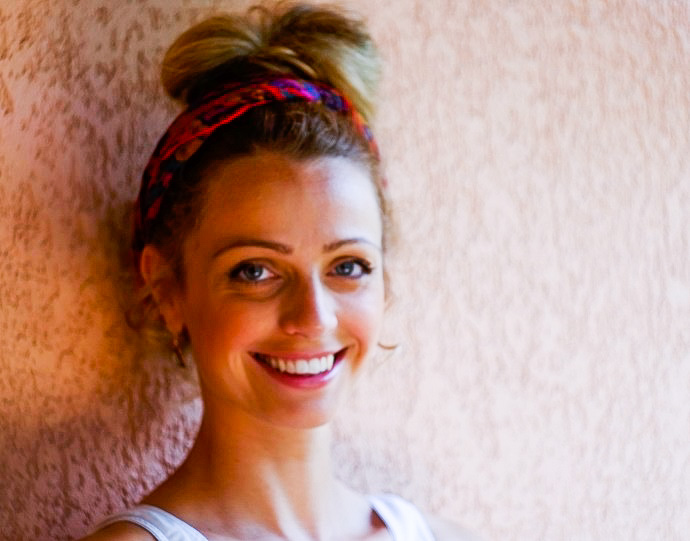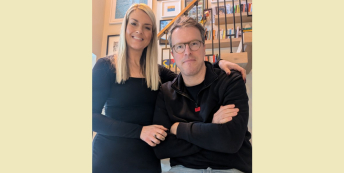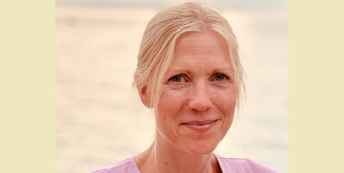“My gut was screaming at me, ‘You have to do this.’”
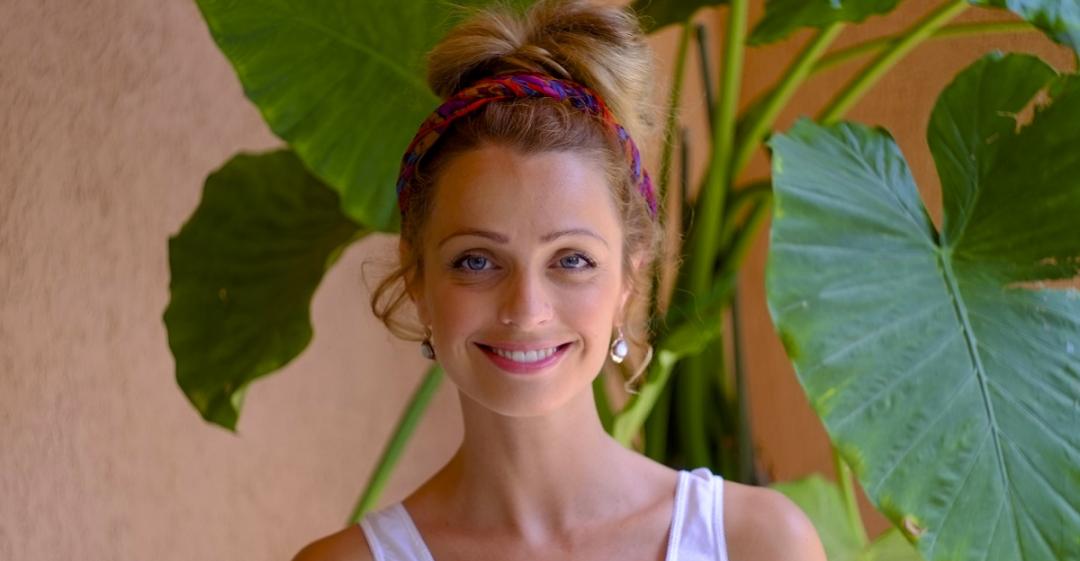
Newly Updated
What work were you doing previously?
I was a full-time paediatric nurse.
Prior to that, I'd trained to be a psychologist.
What are you doing now?
I'm the founder and CEO of a charity – indiGO Volunteers.
We place volunteers with projects abroad and without charging any money.
The benefit is that people can afford to volunteer. And because we're not making any money out of it, we can be more ethical about it; we'll only place people if it makes sense for the project and that person – not because there's profit in it.
I'm currently based in Bosnia coordinating a remote team. I manage people and keep an eye on everything, basically. We now have 26 people in the team, mostly part-time because they're volunteering.
Very occasionally I still do some nursing at Chelsea and Westminster hospital, so I'm able to keep my registration. I work on the paediatric high-dependency unit.
Why did you change?
There are so many elements of nursing that I love.
Being able to help a family during a difficult time is an absolute privilege. I often did night shifts, and my aim was to make the family feel confident that I would care really well for their child so they could get a good night's sleep.
I love the pressured working environment and the teamwork needed every shift. It's also a place where there is never-ending learning to do.
But the shift work pattern was tough, and I hated having no control over my hours.
When I'd been at university I'd helped out with charity stuff and I'd always wanted to get involved with the humanitarian sector.
The problem was I had absolutely no idea how to do that – no role models, no clue how to start. So, I put it on the back burner, thinking "Oh well, that's a nice dream job, but it's impossible to get into".
I'm a big believer in listening to your gut and I just knew psychology wouldn't make me happy.
So, later on I took a job as a PA to give me time to reflect. And then I decided to retrain as a nurse.
I was looking to volunteer abroad, but the only way I could do it was by paying an organisation thousands of pounds for a placement. I couldn't afford it – and it didn't feel right to have to part with so much cash. That's when the idea for indiGO first came to me.
Making the transition was always in the back of my mind once I realised there was a need for this.
When was the moment you decided to make the change?
It started the moment I found out you have to pay to volunteer abroad.
In my final year of retraining as a nurse about a hundred of us wanted to do an elective placement abroad, but companies wanted to charge £2,000–£3,000 ($2,500–$3,800) and only a handful of people were able to afford to do it.
It was so frustrating – and wrong!
After a lot of research, I got in touch with a health clinic in the middle of Malawi who were willing to accept us – no fees involved. So I arranged the placement.
On that trip I came across a lot of other projects that really needed volunteers but couldn't access them. And I knew a bunch of people wanting to volunteer, but they couldn't access the projects.
This was my light-bulb moment. I could see there was a huge need and decided I could help sort it out in my spare time.
I organised another trip to research this further, around the time I was getting married. I had no money for the trip, so we asked for donations instead of wedding gifts.
It was much better than getting a toaster!
Are you happy with the change?
An emphatic yes!
I have never once thought I should have done something else.
I see the world as a place that is very misbalanced. I'm sure most people can resonate that it doesn't feel right that some people have so much opportunity and access to services, whilst others have none or very little.
IndiGO is my very small way of trying to help with restoring this balance. The projects we support with volunteers are set up to help communities in various ways. Volunteers might help with business plans, teach healthcare, prepare and distribute food, or whatever their role might be. In this way, we are helping people by improving their education, ensuring they receive food, providing health care, and so on – all things many of us are used to having.
This is such an incredible, women-led organisation. As long as I can eat, have a roof over my head, and do amazing things with indiGO, then I'm happy.
What do you miss and what don't you miss?
I definitely don't miss the shift work – at all.
I love being able to choose my own hours; the downside to that is that I can put a lot of pressure on myself and it's hard to switch off.
While I'm managing everyone remotely, there's no-one to manage me and say "Holly, you've worked enough – stop now".
I work on my own here in Bosnia and I miss having a team around me. Being by myself can be quite overwhelming at times.
How did you go about making the shift?
It wasn't a straightforward transition or an overnight leap; in fact, it's been a long, slow process.
I first started indiGO about ten years ago. We had no reputation and hardly any projects. As projects came up I added them to the website – a few people took a gamble on us and we've grown slowly and organically.
I nursed full-time whilst also trying to set up the charity, around my shift work.
It was virtually impossible. I'd finish a set of shifts, just feel I was starting to recover, then the next set of shifts would start. With trying to squeeze in friends, family, and having a life outside work, there wasn't much time left for setting up a charity.
I made the decision to go part-time, but a year later it was still too difficult – I was really struggling.
That's when I decided to follow my intuition and focus on the charity, just doing the occasional nursing shift. My gut was screaming at me, "You have to do this!". I just knew indiGO was the right thing to do and I had this calm sense that it would all come good in the end, but that it was going to be a bit of a journey to get there.
It wasn't easy – it was just me for the first four years – but the occasional nursing was great as I knew I would always have some work.
A couple of years ago I volunteered with a charity called Help Refugees. When I came back from that trip I knew I had to move to Greece for a longer period of time to help.
Help Refugees asked if I would go and be Volunteer Coordinator on the ground in northern Greece. This was my dream job – to be funded, and I leapt at the chance. It was essentially doing indiGO work, but in the field, so it was a perfect fit.
After a few months they funded indiGO to be here and do volunteer coordination; now, we have two people in Greece and me in Bosnia, managing the team. Our projects around the rest of the world are coordinated remotely.
We're extremely lucky that 18 months later, Help Refugees still support indiGO and fund our crisis work in the Balkans.
What didn't go well? What wrong turns did you take?
It's taken years and years to get to where I am.
I was feeling my way with no real clue, so I wish I'd taken more advice at the start. If I'd had a strategic plan in place, it definitely would have helped.
At the beginning, while I was still nursing full-time, I just couldn't get any momentum going; it was so frustrating for time to keep passing without much progress being made. After a year of trying to do both, I knew I had to go part-time to actually get the ball rolling properly. The only option was to cut back on nursing.
Also, a process like this can make relationships challenging.
My ex-husband was incredibly supportive during the creation and building of indiGO. However, as he got more involved, we realised our different working styles clashed.
I love detail and he loved the big picture; I love working in chaos, and he loved order, and so on. When I moved to Greece, I felt I had found my calling and was in my element. But for him, it wasn't the right working environment.
We found ourselves on different paths, in different countries. The whole process highlighted some of our fundamental differences.
I was so sure I wanted to live abroad, and when our marriage broke down last year I had no family and friends around me. So it's been really tough at times. But I still chose to stay living abroad and focused on indiGO because that's what gives me purpose and grounding.
Now, we both have exciting projects going on and just want the best for each other.
How did you handle your finances to make the shift possible?
I've never been a 'must have this, must have that' kind of person.
Living with limited funds meant I had to be OK with making do. So I got everything second-hand – my phone, and a TV that was passed on to me.
I did have to miss out on stuff, but I had amazingly supportive people around me who understood that I was setting up a charity and that I needed to live a simple life.
I lived in London at the time and made myself live in places that didn't cost much money. When I got married and moved back in with my mum so had no rent for a year. Although it's the last thing you want to do as a newly married couple, and the lack of money was frustrating at times, we got round it – and it really was worth it. In fact it's surprising how not worrying about 'stuff' can make you so much happier.
What was the most difficult thing about changing?
When I was in nursing I was part of a team; then suddenly – boom – I was on my own.
I couldn't afford an office so I would work from home; sometimes I wouldn't leave the house for a couple of days, like a hermit.
I'm quite emotionally strong and most of the time I used to plod along fine working by myself, but once in a while I'd worry that it was too big, and feel the lack of immediate support around me. People were cheering me on but the workload was overwhelming at times.
It's also an emotionally draining environment. Just today I've seen photos of a refugee who was beaten up by police; it's pretty normal for me to hear a near-constant stream of distressing things.
My work helping migrants can hit a few nerves with people and I'm constantly challenging ignorance. Sometimes, I find I don't tell new people what I do, until I gauge that it is OK to do so.
I've had people argue with me in the street back home. Even some people in my close network don't really understand or necessarily support my work – but the friends who do get it are incredibly supportive.
Living in the field long term is also hard in terms of missing my friends and family.
Of course, I make new friends, but it's such a transient community! People might stay for three weeks or three months, and they're gone again, whilst I stay.
Nothing has prepared me for that part of the job, to be constantly having to say goodbye to great people.
To combat that, I fly home for long weekends regularly, so I can stay sane and be in an environment I'm familiar with.
What help did you get? 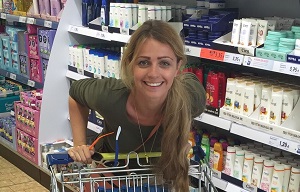
When you start something yourself people are intrigued and want to help.
It comes from the strangest places. One of the first volunteers I placed asked to meet me – we hit it off and now she's one of the coordinators in Greece. I've found that people have been attracted to what we're doing, so I haven't had to go off and search for help that often. People who really believe in the idea have found us.
I absolutely could not have done this without my support network: my mum, whom we lived with so I could cut back on expenses; my friends, who understood about my lack of money and believed in the idea of indiGO; and my team here. They are my saviours and such a great bunch of people.
What resources would you recommend to others?
I'm not very good at spending hours online researching stuff, so my approach has been to reach out to people directly.
First and foremost, I'd say you need to think about all the work roles your friends and family have, then use them. I have a friend who is an accountant, so I went straight to them. People are happy to give advice. Your own network can be your best resource.
Outside of my immediate network, I spoke to people that had already set up a charity, whom I already had a loose connection with, and asked them to give me all their advice. I'd go to meetings and get some really top tips from people.
Tap people for information. Even if you don't know them they're often happy to meet up and give you help and advice.
If you don't have a support network, there are loads of online groups where people will cheer you on, so there are ways to get round this.
What have you learned in the process?
Sometimes I take a step back and think, "Wow. This was the seed of an idea, and now look at us."
It's incredible to think that I've had the courage to do this – I didn't know that I could believe in myself that much.
I still have to pinch myself that indiGO is funded to be out here, but the only reason it is funded is because I took those steps and put myself out there in the first place. I've learned that things work out if you have the courage to put yourself out there.
I used to worry that I wouldn't be a good leader, but I now know I'm good at motivating people – I didn't know that about myself before. I try to be the kind of leader that I would want to work for.
I've learnt that I love working in chaotic environments. It's something my partner and I used to struggle with, as he loved calmness and I was always squeezing everything into every minute of the day. When I came to Greece I felt free and finally in an environment where I could help create some order amidst the chaos.
I don't know how to say this without sounding cheesy, but humans are incredible at helping each other. The acts I have seen strangers do for others are just amazing. With what I do I get to see the best and the worst – but mainly the best – in humans.
It's put so much in perspective. If my phone smashes or I lose something, I just think "Oh, that’s annoying" and then I just carry on. I know I've got food. It doesn't matter.
What do you wish you'd done differently?
I don't have a business background and wish I'd been more efficient and taken advice at the beginning.
I never formalised anything, I just bumbled along; a strategic plan would have been massively helpful.
What would you advise others to do in the same situation?
I'm a complete believer that if you're really passionate about something you'll find a way to make it work.
But the main thing is to actually start.
It's OK to start to small. If it grows, it grows. Just keep moving forward.
Put pen to paper. Work out what you need to achieve, and how to get there. And follow it. Make your goals and timeframes realistic because if they're not and you don't hit them you'll get demotivated really quickly.
Finally, don't see a move away from where you are as a compromise. Forget about prioritising money; do work that makes you happy. You'll be so distracted being happy that you won't even think about the compromises you're making.
We caught up with Holly recently to see how her shift was working out, roughly 18 months on. Here's what she's been up to, and the biggest lessons she's learned.
What's changed for you in your career since we first published your story?
I was living in Bosnia when my story was published.
My boyfriend and I had been working hard out there for a while, and conditions were tough. It was a hostile and often violent atmosphere, and we were doing things like accompanying people to hospital appointments, and supporting terminally ill patients.
The work was very intense, and we started to feel burnt out from it. My boyfriend told me that he wanted to leave Bosnia for a break, which made me realise that I needed some extra support. So, I returned home to London for six months.
I carried on working from home, managing on-the-ground operations for my charity remotely. But I soon got itchy feet, working on my own. I wanted to be back out in the field!
Indigo now employ five full-time people. So, I decided to get everybody together for a team meeting, choosing Lesbos as the location. Lots of refugee boats were turning up on the Greek islands, and I wanted to see how we might be able to help.
We had such an incredible week, developing and motivating ourselves as a team, and planning future work. Together, we made a huge decision to relocate the charity's operations to Samos, another Greek island with lots of new refugees.
How do you feel about your work now?
Sometimes I can't believe we've been going for five years!
I'm so proud of everything we've achieved in that time.
Moving the team to Samos has turned out to be a fantastic decision. Our help is desperately needed here – the island is a refugee hotspot, and lots of new people are arriving every day.
There's a lot of work to do, so we do lots of collaborating with other charities and not-for-profit organisations. I was chosen to chair our co-ordination meetings, and I'm so happy to be able to do that.
What challenges have come up for you since you made your shift, and how specifically have you dealt with them?
Perhaps unusually for a CEO, I love working directly in the field – it's why I started Indigo in the first place.
But the work is difficult, tiring and relentless. It's so easy to feel burnt out, and lose sight of the bigger picture. I also have to consider that I'm the public 'face' of the charity, promoting and speaking about the work we do.
I love both aspects of the role, but I've learned that taking breaks every now and again is essential. They help me to recharge, and get back to doing my best work.
Day-to-day, I do feel that every decision I make has a huge amount of weight behind it. What we do affects lots of people's lives, and that can be hard sometimes. There are lots of other places where our work is desperately needed, and I always feel that we could be doing more than we are.
But I try to focus my efforts on the here and now, and on the great work we're already doing.
I would also love to settle down and have a family at some point, so I've started thinking more about how I could balance everything I do with a 'normal' life. But I love my work, and I'm in a good place right now, so I suppose whatever happens, will happen.
How is the financial side of things panning out, and is this what you'd expected?
Good question!
There have been some hairy moments, and we have definitely struggled at times.
But somehow, we always manage to find a way to make ends meet.
We've been lucky enough to win a new grant recently, and we're always actively looking for other sources of income, such as corporate fundraising. One particular company has been doing charity bike rides for us over the past couple of years, and it's helped so much.
Out of necessity, we've had to start taking a more professional approach to fundraising, such as producing detailed impact reports about the work we do. It's been a huge learning curve.
Is there anything else you'd like to share?
You only get one shot at life, so you have to do whatever makes you happy.
It's all about focusing on your purpose, and on what really drives you.
When it comes to making decisions, I'm a huge believer in trusting my gut feeling. I think things like money worries will naturally sort themselves out, if you're willing to work hard on something you really love.
For more information about indiGO Volunteers, visit www.indigovolunteers.org.
What lessons could you take from Holly's story to use in your own career change? Let us know in the comments below.

